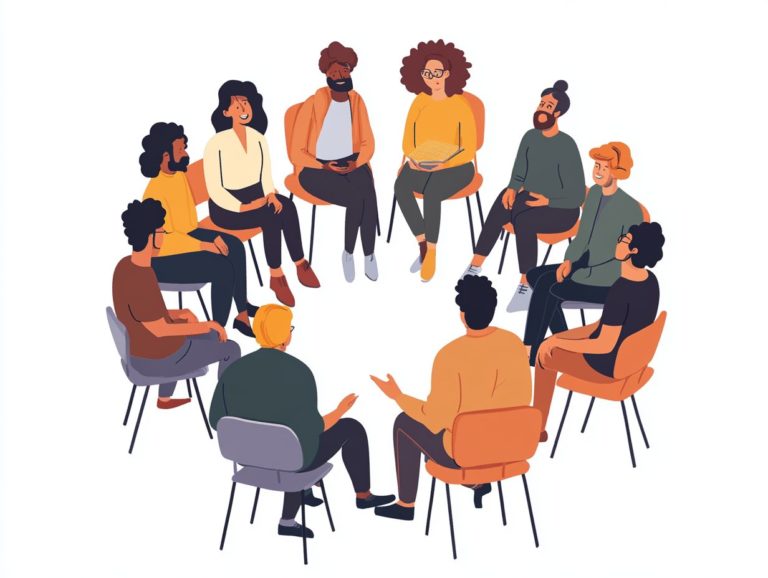5 Common Limiting Beliefs and How to Overcome Them
Have you ever thought, I m not good enough or I don t deserve happiness ? These nagging ideas, called limiting beliefs, can undermine your potential and joy.
This article explores five common limiting beliefs that many face. We ll uncover their origins and how they can hold you back in life.
This article also offers practical strategies, techniques, and uplifting affirmations to help you break free and foster a growth mindset.
Start your exciting journey now! Confront and dismantle those mental barriers to unlock the vibrant life you deserve.
Contents
- Key Takeaways:
- 1. “I’m Not Good Enough”
- 2. “I Don’t Deserve Happiness”
- 3. “I Can’t Change”
- 4. “I’m Not Lucky Enough”
- 5. “I Don’t Have Enough Time”
- What Are Limiting Beliefs and How Do They Affect Us?
- Where Do Limiting Beliefs Come From?
- How Can Limiting Beliefs Hold Us Back?
- What Are the Most Common Limiting Beliefs?
- How Can We Overcome Limiting Beliefs?
- What Are Some Techniques for Challenging Limiting Beliefs?
- How Can Positive Affirmations Help Overcome Limiting Beliefs?
- What Are the Benefits of Overcoming Limiting Beliefs?
- How Can We Prevent Limiting Beliefs from Holding Us Back in the Future?
- What Are Some Inspirational Quotes to Help Overcome Limiting Beliefs?
- How Can Therapy or Coaching Help Overcome Limiting Beliefs?
- How Can We Support Others in Overcoming Their Limiting Beliefs?
- What Are the Long-Term Effects of Holding onto Limiting Beliefs?
- How Can We Cultivate a Growth Mindset to Overcome Limiting Beliefs?
- Frequently Asked Questions
- What are the 5 common limiting beliefs?
- How do limiting beliefs hold us back?
- How can we overcome the belief of I’m not good enough ?
- What can we do to overcome the belief of I don’t have enough time, money, or resources ?
- How do we combat the limiting belief of I’m not smart, strong, or talented enough ?
- How can we overcome the belief of I don’t deserve success, happiness, or love ?
Key Takeaways:

- “Don’t let your self-doubt hold you back – you are enough just as you are.”
- “Believe that you deserve happiness and take steps towards achieving it.”
- “Change is possible and within your control – don’t let limiting beliefs hold you back.”
1. “I’m Not Good Enough”
The belief that “I’m not good enough” often arises from deeply rooted imposter syndrome, which is the feeling of being a fraud, that you don t deserve your achievements. This struggle with self-doubt can be a heavy burden, impacting your self-esteem and your dreams.
In professional settings, this all-too-common belief can lead to hesitance in pursuing promotions or new job opportunities. The fear of inadequacy overshadows the potential for achievement. When applying for jobs, you might hold back from showcasing your skills and experiences, which are crucial for standing out in a competitive landscape.
These limiting beliefs often trace back to childhood experiences. Criticism or unrealistic expectations can foster a negative self-image, reinforcing the notion that you are unworthy of success. Such early influences create a cyclical pattern of self-doubt, making it increasingly challenging for you to realize your true potential.
2. “I Don’t Deserve Happiness”
Feeling unworthy of happiness is a sentiment that many grapple with, often rooted in negative thoughts and societal expectations. This mindset can cause you to overlook valuable opportunities for personal fulfillment and professional growth.
You can break free from these negative patterns by embracing positive affirmations as a powerful tool for rebuilding your self-worth. Reflecting on your achievements no matter how small can help cultivate a more positive self-image.
Incorporating daily reminders of your value and potential can dramatically shift your perspective, enabling you to dismantle limiting beliefs and wholeheartedly embrace your unique journey toward self-acceptance.
3. “I Can’t Change”
The belief that “I can’t change” is a powerful limiting mindset. It can hold you back from pursuing new career opportunities and personal growth. It’s often rooted in rigid belief systems that stifle your ability to improve and overcome challenges.
When you transition to a growth mindset, you’ll find that the landscape of career possibilities opens up dramatically. This shift encourages you to embrace challenges, viewing setbacks not as insurmountable obstacles but as stepping stones toward greater competence.
For instance, if you’re facing job insecurity, you might begin acquiring new skills through online courses. This can lead to a promotion or even a complete career transformation. This adaptive mindset fosters resilience, enabling you to collaborate more effectively and innovate within your role, boosting overall workplace performance.
By acknowledging that learning and growth are ongoing processes, you can actively seek feedback and pursue paths you once deemed impossible.
4. “I’m Not Lucky Enough”
Believing that “I’m not lucky enough” can seriously hold you back from reaching your career aspirations. It can stop you from seizing great job opportunities and create a fear of rejection that stifles your potential growth and leadership skills in the workplace.
This limiting mindset may stop you from applying for roles you re genuinely qualified for or from preparing adequately for interviews, as you might think that your efforts will lead to disappointing outcomes. Instead, it s crucial for you to acknowledge your own competencies and understand that success is typically the result of diligence, skill, and perseverance rather than just luck.
Shift your focus today to unlock your success! By concentrating on consistent hard work and self-improvement, you can craft a more enabling narrative that fuels your pursuit of career satisfaction and opens up new possibilities.
5. “I Don’t Have Enough Time”
The notion of “I don’t have enough time” often reveals a deeper struggle with balancing work and personal life, flexibility, and the pursuit of career aspirations. It’s crucial for you to reassess your time management strategies to nurture your personal growth.
In this light, implementing practical techniques like setting clear priorities can markedly boost your productivity while ensuring you derive personal satisfaction. Methods such as the Pomodoro Technique, a method where you work for a set amount of time and then take short breaks, or time blocking offer a structured framework, allowing you to engage in focused work sessions punctuated by breaks to recharge.
By emphasizing self-reflection, you’ll acknowledge your accomplishments and identify areas for improvement, creating a sense of fulfillment. This balance enhances your mental well-being by alleviating stress and fostering a more harmonious lifestyle.
Your personal aspirations can flourish alongside your professional commitments, leading to a richer and more satisfying life experience.
What Are Limiting Beliefs and How Do They Affect Us?

Limiting beliefs are the deep convictions that can hold you back from success, obstructing both your personal and professional growth. They can take a toll on your mental health, create career challenges, and diminish your self-awareness, endlessly cycling through fear of failure and self-doubt. Overcoming these beliefs can be transformative, and using 5 daily affirmations to break limiting beliefs can help you shift your mindset.
These beliefs often stem from past experiences, societal expectations, and the judgments of others during your formative years. When you internalize these perceptions, you might unconsciously sabotage your own efforts, especially during pivotal career transitions. For instance, you might hesitate to pursue a promotion because of a fixed mindset telling you that you re not qualified, thereby squandering your true potential.
The impact of these beliefs can ripple beyond your professional life, affecting personal relationships and your overall well-being. To identify these beliefs, you ll need some introspection and honest self-assessment. Addressing them might involve seeking professional guidance or employing methods to change how you think, which can help cultivate a healthier, more resilient mindset.
Where Do Limiting Beliefs Come From?
Limiting beliefs often emerge from childhood conditioning, societal norms, and cultural influences, as well as messages perpetuated by the media. These factors shape your belief systems and self-identity throughout your life.
From the moment you begin to interact with your environment, you absorb messages about what is possible and what is not. This can create negative self-talk that affects you as an adult. For example, if a young student internalizes a teacher’s offhand comment about their writing skills, they might come to believe they lack creativity, which can stifle their confidence in self-expression.
Societal expectations further reinforce these beliefs. Gender roles might dictate your job ambitions, while cultural stereotypes could discourage you from pursuing certain paths. By understanding the origins of these beliefs, you can begin to deconstruct them, realizing that the barriers you perceive are often not truths but rather unexamined fears instilled by external influences.
How Can Limiting Beliefs Hold Us Back?
Limiting beliefs can significantly hold you back. They nurture self-doubt and instill a fear of rejection that negatively impacts your professional development and career transitions in various workplace cultures. To effectively address this, consider exploring overcoming limiting beliefs: a step-by-step guide.
For instance, if you believe you’re not qualified enough, you might hesitate to apply for roles that are genuinely within your reach. This can lead to missed opportunities. During interview preparation, this mindset may cause you to engage in excessive self-criticism, making it easy to overlook your own accomplishments and skills.
Such persistent negativity not only hinders your internal mobility making you shy away from promotions or lateral moves but also creates a cycle where your ambitions feel increasingly unattainable.
Ultimately, these limiting beliefs can stifle your professional growth and restrict your ability to achieve personal goals. They undermine your confidence and the potential for a fulfilling career.
What Are the Most Common Limiting Beliefs?
Some common limiting beliefs revolve around self-identity, such as thinking, “I’m not skilled enough” or “I don’t have what it takes.” These thoughts often stem from fears related to career challenges and personal growth, but asking the right questions can help. Consider exploring these 5 key questions to challenge limiting beliefs.
These beliefs can create significant barriers to pursuing new opportunities. They instill a sense of inadequacy that hampers your decision-making and willingness to take risks, making it essential to explore ways to reframe limiting beliefs.
You may find yourself paralyzed by the fear of failure or judgment, which can make it tough to voice your opinions or step into leadership roles. This internal struggle may lead to chronic self-doubt, preventing you from seeking promotions or exploring new career paths.
As a result, many individuals find themselves trapped in roles that no longer bring satisfaction. Ultimately, this stifles their professional aspirations and personal fulfillment.
How Can We Overcome Limiting Beliefs?
Overcoming limiting beliefs is absolutely within your reach! By embracing self-reflection, adopting a growth mindset, and using techniques like positive affirmations, you can confront and dismantle those self-imposed barriers to success, especially with resources like 5 online courses to overcome limiting beliefs.
Engaging in self-improvement practices, such as journaling, offers valuable insights into your thought patterns and behaviors. This helps you pinpoint the specific beliefs that may be holding you back.
Surrounding yourself with supportive individuals reinforces positive changes and provides a sense of accountability. Setting achievable goals fosters a sense of progress, while learning new skills boosts your confidence and nurtures resilience.
Embracing failure as a learning opportunity, rather than viewing it as a setback, is essential for cultivating a success-oriented mindset. This shift enables you to break free from limiting beliefs and pursue your aspirations with renewed vigor.
What Are Some Techniques for Challenging Limiting Beliefs?
Challenging your limiting beliefs can be accomplished through various techniques, such as changing negative thoughts to positive ones, self-awareness practices, and positive affirmations all promoting self-acceptance and enabling you to reshape your personal narrative.
By identifying and questioning these beliefs, you can shift from a mindset of doubt to one filled with possibility. For example, keeping a daily journal to document your negative thoughts can enhance your self-awareness and help you recognize patterns that might be holding you back.
Cognitive restructuring helps you reframe negative thoughts into positive, empowering statements. Instead of thinking, “I can’t do this,” you might tell yourself, “I am capable of learning and improving.”
Incorporating daily positive affirmations reinforces this new mindset. Through consistent, constructive self-talk, you cultivate growth and resilience. Start adopting these strategies today to unlock your full potential!
Ultimately, embracing these strategies not only combats self-limiting beliefs but also fosters a deeper sense of fulfillment and potential within you.
How Can Positive Affirmations Help Overcome Limiting Beliefs?

Positive affirmations can be a game changer. They help break down pesky limiting beliefs and enhance your mental health, boost your self-esteem, and foster a deeper sense of self-acceptance and worth, especially when negative thoughts creep in.
The science behind this is fascinating: when you consistently vocalize specific positive statements, you can reshape your neural pathways, making it easier to embrace a more optimistic mindset. This transformation goes beyond feeling good; it brings tangible psychological benefits that enhance your emotional resilience. For instance, affirmations like “I am capable and strong” or “I deserve happiness” serve as powerful reminders to counteract those daily self-doubts.
To effectively weave these affirmations into your routine, consider these strategies:
- Carve out a few minutes each morning or before bed for focused practice.
- Journal your affirmations to reinforce them.
- Use visual reminders around your living space to keep them front of mind.
By engaging in these practices consistently, you can weaken the grip of limiting beliefs, paving the way for personal growth and a more fulfilling life.
What Are the Benefits of Overcoming Limiting Beliefs?
Overcoming your limiting beliefs can unlock a world of benefits, such as enhanced personal growth, improved career satisfaction, and greater access to professional opportunities. This journey ultimately fosters self-improvement and paves the way for a more fulfilling life.
When you break free from self-imposed restrictions, you often unearth a newfound confidence that elevates your workplace performance. This shift not only boosts your productivity but also cultivates a collaborative atmosphere, encouraging team members to freely share ideas and take calculated risks.
As you embrace challenges instead of shying away from them, you set an inspiring example for your colleagues. This creates a ripple effect that strengthens team dynamics, transforming the workspace into a more innovative environment. In this setting, success becomes a shared goal, propelling both your personal growth and the overall progress of the organization. Don t miss out on the chance to unlock your potential!
How Can We Prevent Limiting Beliefs from Holding Us Back in the Future?
Preventing limiting beliefs from holding you back in the future requires ongoing self-awareness, a commitment to continuous improvement, and proactive personal development strategies. Exploring resources like the top 5 books on overcoming limiting beliefs can help you recognize and address your internal barriers.
To cultivate this essential self-awareness, you can engage in regular self-reflection through journaling or mindfulness practices. These activities will help you identify thought and behavior patterns that may be hindering your progress.
By setting realistic career goals, you can create a tangible roadmap that directs your efforts and keeps you motivated. This approach not only assists you in overcoming limiting beliefs but also fosters a growth mindset, enabling you to embrace challenges, learn from criticism, and celebrate small victories along the way.
By making these proactive choices, you can significantly enhance your personal and professional development.
What Are Some Inspirational Quotes to Help Overcome Limiting Beliefs?
Inspirational quotes can be powerful motivators on your journey to overcome limiting beliefs, offering wisdom and encouragement as you seek personal growth and self-improvement through your challenges.
These short, powerful quotes resonate with anyone dealing with self-doubt or fear of failure, serving as gentle reminders to look beyond perceived limitations. By weaving these quotes into your daily life, you create a supportive environment that nurtures resilience and fuels the pursuit of your passions.
Simple practices, like placing your favorite quotes in visible spots or incorporating them into your daily affirmations, allow these enabling messages to become part of your daily narrative. This fosters a mindset that not only embraces your potential but also cultivates strength in the face of adversity.
Start today by integrating these quotes into your routine and watch your confidence soar!
How Can Therapy or Coaching Help Overcome Limiting Beliefs?
Therapy and coaching can play a pivotal role in helping you overcome limiting beliefs.
They create a structured environment for self-reflection and personal development, allowing you to delve into your fears and address the underlying issues that impact your mental health.
You may find that various approaches, such as cognitive behavioral therapy (CBT), a method that helps change negative thinking patterns, mindfulness-based coaching, and narrative therapy, which focuses on the stories we tell ourselves and helps reshape them, are particularly effective in identifying and shifting harmful thought patterns.
Countless success stories highlight how guided sessions have enabled individuals like you to challenge perceived limitations, cultivating profound self-acceptance and resilience.
With professional guidance, you can learn to rewrite your internal narratives, opening the door to personal growth and enabling you to achieve goals you once deemed unattainable.
The transformative potential of these therapeutic interactions highlights the importance of specialized support on your journey toward emotional liberation and empowerment.
How Can We Support Others in Overcoming Their Limiting Beliefs?
Supporting others in overcoming their limiting beliefs means you ll need to provide encouragement, foster self-acceptance, and help them challenge their belief systems.
This approach not only enhances team dynamics but also promotes a culture focused on growth.
To truly achieve this, practicing active listening is vital; it allows you to hear their concerns and aspirations without judgment.
Creating such a space encourages them to express their thoughts freely, paving the way for deeper discussions that can unveil underlying fears.
By offering constructive feedback, you can guide them in reevaluating their perceptions, transforming doubts into actionable goals.
When you nurture a safe environment that values open dialogue, you enable individuals to confront challenges and support one another on their journeys toward personal and professional growth.
What Are the Long-Term Effects of Holding onto Limiting Beliefs?

Holding onto limiting beliefs can severely impact your mental health, career trajectory, and sense of self, ultimately stunting your personal growth and leading to unfulfilled potential over time.
These beliefs can ensnare you in a cycle of negativity, where doubt creeps in, making you hesitant to seize opportunities that could propel you toward advancement and fulfillment.
As the weight of these self-imposed barriers accumulates, you may find yourself grappling with heightened stress, anxiety, and stagnation in both your personal and professional development.
Confronting and dismantling these beliefs is essential for your journey to success! Doing so cultivates resilience and paves the way for new possibilities.
By tackling these obstacles head-on, you can enhance your well-being and carve out a more gratifying career path, aligning your personal aspirations with achievable outcomes.
How Can We Cultivate a Growth Mindset to Overcome Limiting Beliefs?
Cultivating a growth mindset is essential for you to overcome limiting beliefs.
It encourages self-improvement, personal development, and resilience through practices like positive affirmations and embracing challenges.
By actively setting specific, measurable goals, you can chart a clear path for your growth journey.
Seeking constructive feedback from peers or mentors will further enhance this process, offering valuable insights that can ignite your improvement.
It s vital to view setbacks not as failures, but as opportunities for learning and growth; each misstep can provide lessons that inform your future actions.
The benefits of adopting this mindset extend far beyond personal gain, significantly enhancing your professional life by fostering innovation, adaptability, and collaboration, ultimately leading you to greater success in various endeavors.
Frequently Asked Questions
What are the 5 common limiting beliefs?
The 5 common limiting beliefs are: I’m not good enough, I don’t have enough time/money/resources, I’m not smart/strong/talented enough, I’m too old/too young, and I don’t deserve success/happiness/love. To overcome these challenges, consider exploring the 5 essential skills to break limiting beliefs.
What limiting beliefs are holding you back? Take a moment to reflect and consider how you can apply these 8 exercises to overcome limiting beliefs today.
How do limiting beliefs hold us back?
Limiting beliefs create self-doubt and fear. They prevent us from taking risks and achieving our full potential, but you can find motivation in 7 quotes to inspire overcoming limiting beliefs.
How can we overcome the belief of I’m not good enough ?
Are you ready to overcome the belief that you’re not good enough? Start by acknowledging your strengths and accomplishments. Challenge negative thoughts and replace them with positive affirmations.
What can we do to overcome the belief of I don’t have enough time, money, or resources ?
To tackle the belief that you lack time, money, or resources, prioritize your goals. Create a budget or plan, and seek support from others. Change how you think to focus on abundance instead of lack.
How do we combat the limiting belief of I’m not smart, strong, or talented enough ?
Combat the belief of not being smart, strong, or talented enough by recognizing that everyone has strengths and weaknesses. Focus on improving your skills and seek opportunities to learn and grow.
How can we overcome the belief of I don’t deserve success, happiness, or love ?
To overcome the belief that you don’t deserve success, happiness, or love, practice self-love and self-care. Surround yourself with positive, supportive people. Challenge negative thought patterns and remind yourself that you are worthy of happiness and success just as you are.






